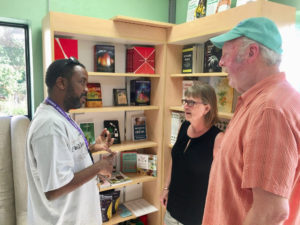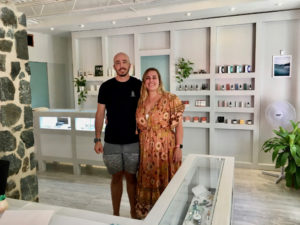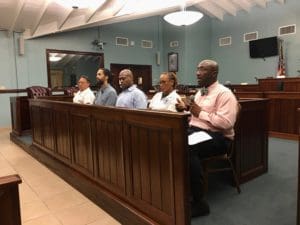This is the second of two stories on cannabis regulations in the U.S. Virgin Islands.

At Healthy Alternatives, a new St. John store that specializes in hemp products, one customer who walked in last Thursday needed little encouragement to tell her story.
“I have rheumatoid arthritis,” said Paula Hachmeister, a resident of northern Illinois who was returning to the island for vacation with her husband.
“Last year, we couldn’t come. I couldn’t walk on a beach because of the pain. The medication they prescribed for my arthritis gave me convulsions, and I read that it also destroys your immune system. Then I went to a wellness physician and started on CBD. The pain and the swelling are gone,” Hachmeister smiled as she held up her hands and wiggled her fingers. “See? No swelling.”
The Hachmeisters stopped by Healthy Alternatives to check out the products containing cannabinoids, also known as CBD, that have been widely used to treat a variety of health problems including sleep disorders, seizures, arthritis and chronic pain.
CBD is a chemical component found in hemp and marijuana. Hemp is actually the exact same plant as cannabis sativa – marijuana – but it contains a much lower dose of the psychoactive ingredient tetrahydrocannabinol, better known as THC, which makes people “high.”
Marijuana is not legal in the U.S. Virgin Islands. However, hemp products that contain 0.3 percent or less THC are now legal and available throughout the territory.
Healthy Alternatives is one of two new shops featuring CBD products that opened for business in January on St. John. Healthy Alternatives, owned by Charmaine Vante and Magabe Calixte, opened in Chocolate Hole above St. John Market. Virginabis, owned by Cynthia Swan, Oliver Wessehoft and William “Teddy” Waldo, opened in Mongoose Junction. Both sell a wide array of oils, lotions and edible products that contain CBD.

Cynthia Swan, one of the owners of Virginabis, said she and her partners began making moves to open a medical marijuana dispensary when the V.I. Senate passed the Virgin Islands Medicinal Cannabis Patient Care Act in January 2019.
However, their original plans have been put on hold. Implementation of the medical marijuana legislation has been delayed while policies and regulations are established. Gov. Albert Bryan Jr. has also proposed legalizing marijuana for adult recreational use which further complicates the role of dispensaries.
In the meantime, owners of would-be dispensaries are biding their time by selling CBD products, hemp clothing and related paraphernalia.
At a town meeting held on St. John Wednesday, Horace Graham, director of the Division of Licensing for the Department of Licensing and Consumer Affairs, said the agency created a new license category for stores specifically selling hemp products.
The agency is trying to keep the business costs of licensing affordable. A hemp product retailer’s license costs $260.
“But if you already are licensed as a retailer, you can get an update for a $50 application fee,” Graham said. Retailers must sign an agreement specifically attesting their willingness to abide by the terms and conditions set by federal law.
Among the conditions is the requirement to purchase only products sold by certified and licensed distributors. All cannabis products sold should contain a QR-Code that provides information on the product’s source and certifies its THC content.
In the wake of lung injuries resulting from the use of unlicensed vaping products in the U.S., the territory’s Department of Licensing and Consumer Affairs is promising to be vigilant about enforcing these regulations.
Juanita Johannes, assistant director of the Division of Environmental Health for DLCA, said officers would be checking to make sure all cannabis products come from an approved source.
“If the product sold is pre-packaged and contains under 0.3 percent THC, we’ll leave you alone,” she said.
As things stand now, no locally made cannabis products can be sold in the Virgin Islands because the territory does not have a laboratory that can certify either the concentration of THC or the purity of CBD products.
The University of the Virgin Islands is considering establishing a lab to test cannabis products, and it might soon be possible to mail products off island for testing in certified labs abroad.
The situation is tricky, however, because although hemp is legal, marijuana is still outlawed under federal regulations.
In June 2019, the U.S. Postal Service issued guidelines for shipping products containing cannabis, and Delegate Stacey Plaskett’s office is now working to smooth out issues particular to the Virgin Islands.

At Wednesday’s town hall meeting at the Legislative Annex in Cruz Bay, panelist discussed other quirks related to the sale of CBD products. Miguel Tricoche, director of Consumer Affairs for DLCA, gave an example: Under present laws, a retailer cannot make and sell a smoothie containing CBD. However, a customer can enter a shop, order a smoothie, buy CBD oil and combine them.
“It’s a matter of safety,” Tricoche explained. “CBDs have a cumulative effect, and the Food and Drug Administration hasn’t determined safety levels yet. If a customer combines them on their own, that’s on them.”
Because research on CBD efficacy is still underway, retailers cannot advertise cannabis products as dietary supplements or as treatments for medical conditions.
Here’s another glitch: Although the FDA has approved CBD for human consumption, it has not yet approved any products for use in animals.
“Does that mean it doesn’t work?” Tricoche asked. “No but get with a vet if you want it for your pet.”
Tricoche added, “This is a very fluid situation. The FDA is still conducting studies. Next week, the information could change.”
New discoveries about the properties of cannabis are being made all the time, according to Waldo, one of the partners in Virginabis. Researchers have identified between 200 and 400 cannabinoids and more than 200 terpenes, any of which may change the effect of a cannabis product.
“It’s all about the individual person,” he said.
CBD products are often classified as “broad spectrum,” containing a wide range of cannabinoids, and “full-spectrum,” containing up to 0.3 percent THC, according to Calixte, one of the owners of Healthy Alternatives.
Although the THC content is limited in legal CBD products, research shows that CBD and THC work well together, Waldo said.
“CBD helps mediate the psychoactive effects of THC. Some people experience anxiety when they use THC. CBDs counteract that,” he said.
When the owners of Virginabis designed the layout for what they hoped would be a medical marijuana dispensary, they created a separate area for customers to consult with staff about the products. This area is largely empty now except for a ping-pong table. They’re not bemoaning the extra space. Finding a suitable location for a medical marijuana dispensary in a small town is challenging.
Under the draft regulations for the Virgin Islands Medicinal Cannabis Patient Care Act, a dispensary cannot be situated within 500 feet of a school, cruise ship dock or pier for cruise ship tenders. Advertising would also be restricted. The reasons for maintaining a certain distance from schools is obvious, and Swan said she presumed the distance from a cruise ship was to prevent passengers from disembarking just to buy marijuana products and then re-boarding with substances that could be illegal in federal waters.
Virginabis’ location in Mongoose Junction was one of the few places in Cruz Bay that qualified. At least four other potential cannabis retailers were also interested in the site, she said.
When medical marijuana becomes legal and Virginabis can apply to become a dispensary, the owners will need to add additional security measures.
Healthy Alternatives, in the former offices of Merchants Commercial Bank, already has the advantage of a camera and security system that allows the staff to buzz in customers. No pun intended.





